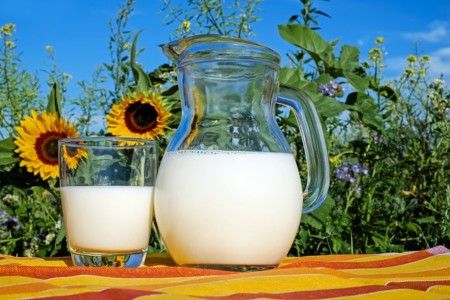Milk What’s healthier Plant-based milk alternatives or cow’s milk

How healthy is milk substitute really?
Use oat, almond or soy milk instead of conventional cow’s milk? Is a plant-based milk alternative really so healthy and can serve as a full-fledged substitute?
For us humans, milk is a must, especially on the breakfast table. Either as an addition to muesli, as a cocoa or a shot in the coffee. More and more people are turning to plant-based milk substitutes.
This includes in particular lactose intolerant people, vegans, people who are allergic to milk protein or those who would like to try something new. The choice of milk substitutes is enormous and is becoming more and more common in supermarkets.
In addition to soy, almond or oat milk, there are far also coconut, rice, cashew, macadamia, or hazelnut milk. But there are also product mixtures with two ingredients on the supermarket shelves.
The somewhat different milk
Vegetable milk substitute, which gives it already in the trade, may not be designated as actual milk. Milk is a protected word and may only be used in connection with cow’s milk.
In addition, animal milk products that come from sheep or goats can also be called milk.
However, the word milk must clearly not stand alone on the packaging. In the case of milk substitute drinks, for example, the term drink is usually used, as in the case of almond or soy drinks.
Nowadays, many consumers use the term milk for the various milk substitute beverages.
Milk alternatives at a glance
Milk substitutes are only valid if the product does not contain cow’s milk. However, nutrition experts advise against such products if there are no health conditions such as milk protein allergy, a lactose intolerance or who attaches great importance to a vegan diet.
In the case, who tolerated so far each milk well, can fall back further on such products.
Milk is a relevant source of nutrients and contains vitamin B2 and B12, calcium and iodine. Therefore, milk is simply indispensable in a wholesome diet.
The German Nutrition Society (DGE) recommends 3 glasses of low-fat milk or milk products per day.
Nutrition experts see milk substitutes as an optimal alternative supplement to cow’s milk. They are suitable for cooking, baking or enjoyment.
Each drink convinces with its advantages and disadvantages, which is always in comparison with the personal food plan composition.
It is important to note that milk substitutes should never be used for infants. As a rule, vegetarian products are advertised as low in fat. This can possibly be said in comparison to whole milk.
In addition, the fat quality is better in some exceptions of the vegetable products. If there is for example with the almond milk much unsaturated fatty acids, cow’s milk has exclusively saturated fats in the contents.
But the proportion in terms of carbohydrates in milk alternatives also varies.
Soy milk with lots of protein and calcium
In contrast to other milk substitute drinks, soy milk scores as an adequate protein supplier. In terms of biological value, this product is on a par with cow’s milk.
After ingestion, the ingredients are very well absorbed and utilized by the body. Who nourishes itself vegan, should make sure to take enough proteins to itself, before it comes to an undersupply.
As a milk substitute, the product is considered only with sufficient protein along with milk-typical properties such as calcium and vitamins.
A low-protein milk substitute is out of the question for those people who have kidney disease and are not allowed to consume too much protein. Calcium is an ideal contributor to bone health.
Hazelnut milk
As the name suggests, the plant milk is made from hazelnuts. The fat content is comparable to cow’s milk.
In terms of color, hazelnut milk is slightly darker than cow’s milk and more closely resembles a glass that has been mixed with some cocoa powder. In fact, the taste is rather sweet and nutty, such as cocoa and Nutella.
This milk can be drunk cold, warm, in coffee or in cereal and is considered very healthy. Contains no saturated fatty acids, cholesterol, but is rich in vitamin E, vitamin B and omega-3 fatty acids.
In addition, this milk type is excellent for skin, hair and for the heart.
Almond milk
Almonds as a type of nut have hardly any fat and are too dry as soon as they are pressed out as an oil seed. That is why almond milk is available as the purest mixture of grated almonds and water.
In the first stage of production, almonds are roasted and then ground into powder or flour. After that, the mixture is mixed well with the water.
In the so-called resting phase, the mixture must be infused so that a milk-like consistency can come about. After straining, the milk substitute gets some sugar, agave syrup or honey added to it.
The taste and color can vary in different drinks depending on how much almond content is present.
Almonds have sufficient unsaturated fatty acids, which has excellent effects especially for the body and can be classified as rather high in calories.




